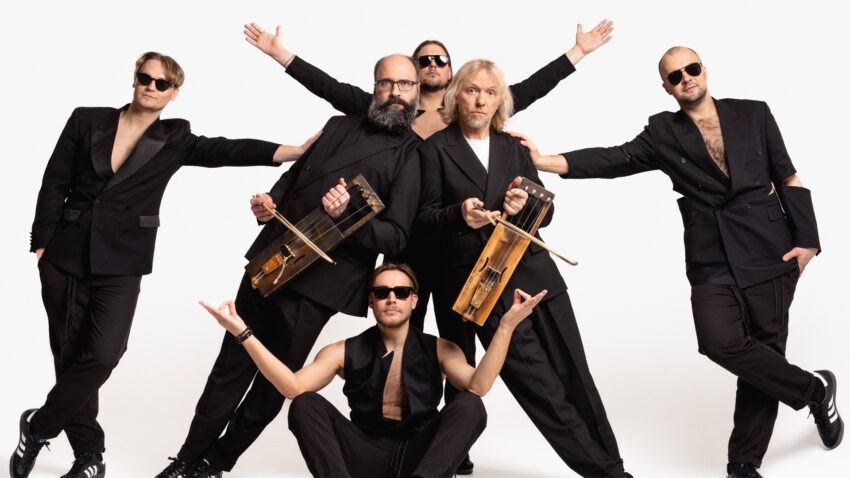The ERR, Estonia’s public television, held the 16th edition of Eesti Laul, Estonia’s well-known pre-selection for Eurovision, during the months of January and February. Following the first semifinal, ten entries competed to become the winners of the contest and succeed Alika at the next Eurovision Song Contest.
The band 5miinust x Puuluup, formed specifically for this edition of Eesti Laul, emerged as the winners of the grand final held in Tallinn after managing to prevail in the superfinal against three other acts. Their song “(Nendest) narkootikumidest ei tea me (küll) midagi” achieved, despite being the third choice for the international jury, to convince the public and win the final round exclusively through televoting.
Who are 5MIINUST x Puuluup?
The rap and folk group 5miinust x Puuluup was specifically created for this edition of Eesti Laul 2024. The members already have years of work behind them, as the group is formed by the duo Puuluup and the quartet 5miinust.
5miinust is a Hip Hop group formed in 2015 by Stoni Kohver, Päevakoer, Põhja-Korea, and Lancelot. The group rose to fame in 2018, when their two studio albums “Aasta plaat” and “Rämmar” reached the top twenty of the national album charts, making them two of the 18 most successful albums in 2018. The following year, they recorded the single “Aluspýkse” with Nublu, becoming the third best-selling song in Estonia in 2019. The singles “Paaristyuked,” “Peo lõpp,” and “Loodus ja hobused” also became hits for the group.
Puuluup is an Estonian nu-folk duo founded in 2014 by Ramo Teder and Marko Veisson. Their instruments are loopers and talharpa, an ancient instrument known throughout Scandinavia but mainly played in Estonia, which has only 3 or 4 strings made of horsehair and is held vertically by a hole built at the top and supported on top or between the knees.
In their songs, the talharpa is electronically mixed with a looper; apart from drawing from traditional Estonian music, they also incorporate various music styles from other countries such as the Sahelian blues style, humorous Russian “chastushkas,” or Estonian punk.
“(nendest) narkootikumidest ei tea me (küll) midagi” the Estonian entry for the Eurovision Song Contest 2024.
The song, which can be translated as “(We Still) Don’t Know Anything About (These) Drugs,” makes history at Eurovision as it holds the record for the longest title in the history of the contest, specifically with 50 characters. The song, composed by Põhja-Korea, köfer, Lancelot, Pääkoer, Marko Veisson, Ramo Teder, and Kim Wennerström, was born one night during a camping trip and barbecue among the members of the two groups.
In general, “(Nendest) narkootikumidest ei tea me (küll) midagi” explores the idea of people choosing not to engage in drug use and how they navigate a society where drug consumption may be frequent or glorified. The theme depicts a group of individuals forging their own path by choosing alternative forms of self-expression, separate from the drug culture around them.
Lyrics of «(nendest) narkootikumidest ei tea me (küll) midagi»
me pole narkomaanid pole midagi teind
kleidid meie seljas on prügikastileid
politseikroonika ja suvilas on reid
ainus kott, mis näha, täis pandipudeleid
me pole narkomaanid pole midagi teind
kleidid meie seljas on prügikastileid
politseikroonika ja suvilas on reid
vormis mehed külas mul on väga okei
uuuuyeeee
uuuu
kuula nüüd seda
saab huugama ära
meid kuulda on täna
a see kott vii ära
ma ei tea narkootikume, limpsi tean ja siidrit
vahet ma ei suudaks teha vitamiinil spiidil
uuuu
kuula nüüd seda
saab huugama ära
meid kuulda on täna
a see kott vii ära
pilvikud ja šampinjonid – kus on teie niidid?
käivitate minu keha nagu köögipliidi
pardikesed väikesed, kuid moonid on nii pikad
mõnuaineid väldime, las seda teevad rikkad
kohal varahommikul ja kirevad kui kikkad
ära viisid kommid mul need kurva näoga plikad
Viiriana Vikkaa
mõnuaineid väldime vaid sest me pole rikkad
tarekese tagatoas on laual ainult IPA-d
prillid on pupilli.. eino pulli pärast ikka
läbi näevad kõigest need, kes jõudnud esiritta
ole vait ja ma pole teind
kuigi ümber minu aint on see tants vaid siin käind jeaa
ole vait ja ma pole näind
kuigi ümber minu aint on see tants vaid siin käind jeaa
Estonia in the Eurovision Song Contest
Estonia debuted in Eurovision in 1994, although technically it attempted to do so in 1993 and was eliminated in the qualifying round in Millstreet. Since then, it has participated 30 times, out of which 18 have been Finalists.
The Baltic republic was particularly successful between 1996 and 2002, reaching the top 10 every year except one, and achieving the first top 5 for any former Soviet country.
Estonia won Eurovision in 2001 in Copenhagen, when Tanel Padar, Dave Benton, and the group 2XL clinched victory with the song “Everybody,” once again marking a milestone as the first former Soviet country to win the contest.
However, between 2004 and 2008, the country experienced a series of non-qualifications for the final until it managed to recover and achieve some stability in its results since Urban Symphony returned a top 10 to the country in 2009.
Since the switch to the new selection format, Estonia has achieved another five top 10 placements with Urban Symphony and their song “Rändajad” (2009), Ott Lepland with “Kuula” (2012), Elina Born and Stig Rästa with “Goodbye To Yesterday” (2015), Elina Nechayeva with “La Forza” (2018), and last year with Alika and the song “Bridges,” which managed to secure a strong eighth position in the final held in Liverpool.

